Record settler attacks in West Bank opening up rifts within Israel
57 minutes agoLucy WilliamsonMiddle East correspondent, West Bank

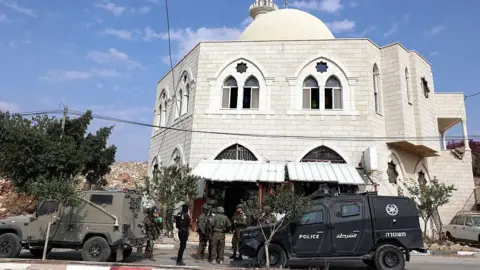 ZAIN JAAFAR/AFP via Getty Images
ZAIN JAAFAR/AFP via Getty ImagesThe marks of the attack on Hamida Mosque, near Deir Istiya in the occupied West Bank, are still scattered on the ground outside.
Charred furniture, lecterns and smoky curls of carpet are piled around the entrance – its guts emptied, and debris cleared, in time for Friday prayers.
Dozens of men arrived for the prayers in a show of defiance – their backs turned towards the scorched and blackened wall.
The imam here, Ahmad Salman, told the BBC the attack on Thursday was a message from Jewish settlers, amid a wave of settler violence across the West Bank.
“The message they want to send is that they can reach anywhere – into cities, into villages, that they can kill civilians and burn houses and mosques.”
“I feel it in my soul,” he said. “It’s not right to touch places of prayer, wherever they are.”
But there was a message here, too, for Israel’s regional military chief – scrawled in Hebrew on the mosque’s exterior wall: “We’re not afraid of you, Avi Bluth.”

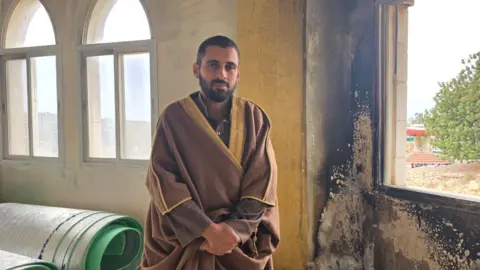
Spiralling settler attacks here over the past six weeks have triggered tough warnings from army leaders, along with a handful of arrests and investigations.
But hardline expansionist settlers enjoy government support, which some believe is pushing the West Bank towards a dangerous confrontation.
The annual olive harvest, when Palestinians try to access their farmland, often marks a spike in violence, but the attacks this year have broken UN records.
The UN Office for Humanitarian Affairs registered more than 260 settler attacks resulting in Palestinian casualties or damage to property in October alone – the highest monthly count since they began monitoring in 2006.
Human rights groups say that settler aggression towards Palestinians has risen since the Gaza War began in 2023 after the 7 October Hamas attacks. UN figures suggest that more than 3,200 Palestinians have been forcibly displaced by settler violence and restrictions since then.
In the past few days, there have been several attacks across the West Bank, including an assault by a large crowd of masked men on an industrial estate and Bedouin buildings near Beit Lid. Security cameras filmed them running across the hillside and through the factory gates, where they torched several trucks. The army said they later attacked Israeli soldiers operating nearby.
The Israel police spokesman said four suspects had been arrested. Three have reportedly since been released.
Last week, in the olive groves around Beita, a Reuters journalist, Raneen Sawafta, was beaten by a settler with a club as she was covering the olive harvest – a deep dent in her helmet clearly showing the force of the blows.
Hamad al-Jagoub abu Rabia, a volunteer with the Red Crescent in Beita, was also injured after going to help her – hit in the head with a rock and later taken to hospital.
“I never imagined a human being created by God would do this,” he said. “If they had an iota of humanity, they would have never done this to a woman. If it wasn’t for her helmet, she could have died.”

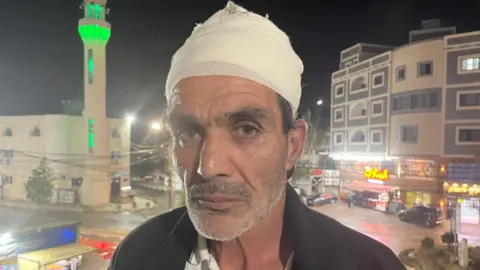
Less than three weeks earlier, 55-year-old Afaf Abu Alia was badly beaten with a club as she lay cowering on the ground during a settler attack, after picking olives on farmland she rents near the village of Abu Falah. The video of her assault drew international condemnation.
“One of [the settlers] attacked me and started beating me – hitting my head, my arms and legs, and kicking my legs with their boots,” she told the BBC. “I fell down. I wasn’t aware of what was happening, my mind went blank – I was only feeling the pain. I felt like my soul was leaving my body. The only thing I thought about was my children.”
Now recovering at home, Afaf said she was still in pain, with 20 stitches in her head, and bruises on her arms and legs that left her unable to sleep.
She said the family had been blocked from its own farmland by settlers, and that they had been renting land elsewhere to grow olives this year.
“I’d return there today if I could, I’m not afraid of them,” Afaf said. But she also acknowledged the situation was becoming riskier.
“They weren’t like this at the start of the war,” she said. “In this one year, they’ve escalated more than in all the years before.”
One man has been arrested in connection with her assault. Arrests like this are rare, and convictions rarer still. The Israeli human rights organisation Yesh Din found that, over the past two decades, more than 93% of police investigations into Israeli offences against Palestinians in the West Bank were closed with no charges filed.

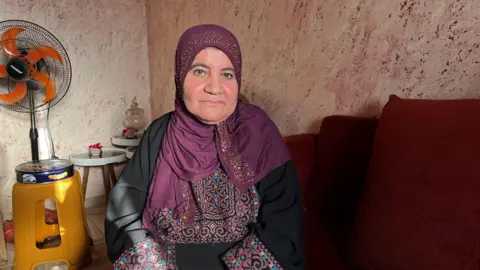
Israeli forces have long been criticised by human rights groups for standing idly by during settler attacks – or even taking part in them.
This week, Israel’s chief of staff said he strongly condemned the recent violence by Israeli settlers, calling it “a red line” and promising to “act decisively”.
The head of the army’s central command, Maj Gen Avi Bluth – the man addressed in the graffiti on Hamida Mosque – said violent acts by what he called “anarchist fringe youth” were “unacceptable and extremely serious” and must be dealt with firmly.
Some hardline settlers see these comments as a betrayal.
Amichai Luria, a long-time settler from Ma’ale Levona and manager of a winery in the nearby settlement of Shiloh, told me the current focus on settler violence was overblown.
“It’s amazing to me how people talk about these rare occasions [when] people misbehave,” he said. “Oh, some people were trying to pick olives and some Jews came and bothered them. Give me a break. There are more muggings on the main street in London than there [are] here.”
I asked him about the severe beating of women and the near-daily reports of incidents in surrounding areas. He dismissed them as an “attempt to make the Jews look bad”.
“Most of the Arabs, if they could, would follow Hamas or Hezbollah. Very, very, very few want to coexist or live in peace, and at the first opportunity they have, they’re going to wipe us out,” he said.
“The future is very simple. Hopefully the army will wake up, hopefully people will understand that we have to prepare ourselves, that they’re coming for us.”
The UN’s Office of Humanitarian Affairs says that, of the 1,000 Palestinians killed in the West Bank since the Gaza War began, between 20 and 32 were killed by Israeli settlers. During the same period, it says, Palestinians killed 19 Israeli civilians.

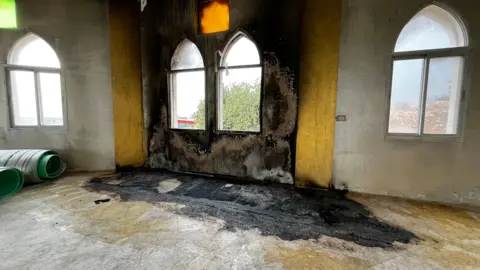
The decision of military leaders to order action on settler violence will test discipline in an army where settlers make up a growing proportion of troops.
It also risks exposing dangerous divisions between Israel’s military and political leaders.
Extremist settlers say their claim to the land comes from the Bible – but their growing confidence comes from government support.
Since the Hamas attacks on 7 October 2023 and the Gaza War that followed, Israel’s far-right National Security Minister, Itamar Ben-Gvir, has handed out more than 100,000 weapons to civilian security squads, including in West Bank settlements, and has urged Israel to formally annex the West Bank.
The government has authorised a sharp expansion of settlements, and legalised some unauthorised outposts. Israeli settlements in the West Bank are illegal under international law, though Israel disputes this.
And the Defence Minister, Israel Katz, last year banned the use of administrative detention for Jewish settlers in the West Bank – reportedly against the advice of Israel’s national security agency.
Israel’s army is now asking Katz to reinstate that power to help curb settler violence. Administrative detention, which allows suspects to be held for renewable six month periods without charge, is still widely used for Palestinians.
“I don’t trust the army like I used to,” Amichai Lurai told me. “A lot of people in the army are anti-Israel from top to bottom. Trust me, the army is not unified.”
Israel’s army is currently embroiled in a legal and political scandal around leaked video footage allegedly showing the abuse of Palestinian detainees – a case that has pitted ultranationalist politicians against the country’s security forces.

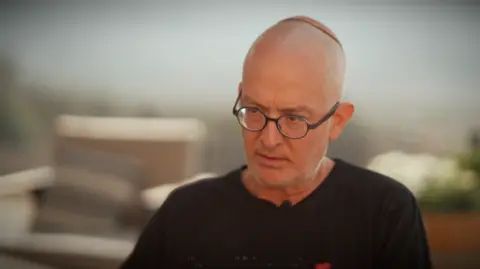
As worshippers left the Hamida Mosque after Friday prayers, Israeli activists arrived on a visit to show solidarity. Martin Goldberg, originally from London, was one of them.
I asked him about Israeli claims that attacks by settlers were overblown.
“They’re very minor attacks, when it’s not happening to you,” he said. “These attacks are not minor, they’re extremely major. Everyone’s trying to belittle it, [saying] oh it’s just the ‘weeds in the field’ but it’s not. And they’re being supported by the government. Local councils are 100% behind them, financing them.”

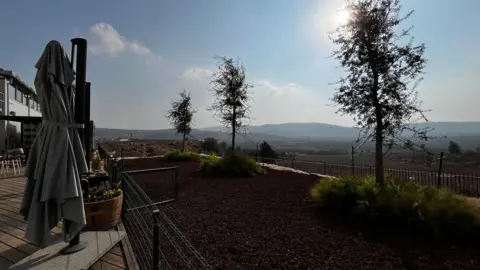
Many local councils provide backing and support to outposts, but have publicly condemned the violence of some settlers there. The chairman of the West Bank Settler Council this week issued a statement supporting the Israeli army in arresting the “anarchists” who harmed soldiers and civilians.
“Europe, the United States, everyone in the whole world is watching the West Bank,” said Wadi abu Awad, a civil engineer who lives in the nearby village of Turmus Aya, which has seen repeated attacks.
“We are not in a fight with the Israelis. We don’t kill Israeli soldiers, we don’t have any hostages. And they [settlers] are pushing us towards the corner. You know, if the cat is pushed the corner, he might become a tiger.”